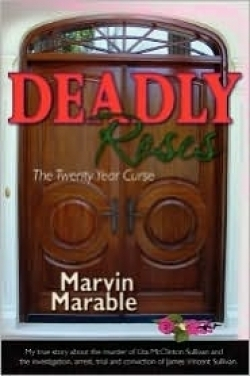Deadly Roses
The Twenty Year Curse
Deadly Roses is a true-crime story rendered in just-the-facts, police-blotter language*.*
The author summarizes his book as the “… true story about the murder of Lita McClinton Sullivan and the investigation, arrest, trial and conviction of James Vincent Sullivan.” Marable’s book focuses primarily on his part in the murder investigation. In fact, because of his friendship with the Sullivans—a prosperous and socially active couple in Macon and Atlanta, Georgia and Palm Beach, Florida—Marable became a prime suspect.
Raised in Mount Vernon, New York, Marable became a police officer and in 1973 a New York State Police trooper. In 1977, he graduated from Iona College in New York, retired from the force, and entered a corporate training program in Chicago. He became intrigued by business opportunities in Atlanta, Georgia and decided to move there, in the process buying a forty-four unit apartment building. That purchase reveals Marable as an intelligent, ambitious individual able to accumulate significant resources, and many readers might wish he elaborated more on his business life.
Soon after moving to Georgia, he married Poppy Finley, the best friend of Lita Sullivan. James Sullivan was a prosperous liquor distributor in Macon, Georgia, and the two couples began to socialize, with Sullivan also giving Marable occasional business advice.
Marvin Marable learned that Sullivan had divorced his first wife and then married McClinton, and while Lita was comfortable in Georgia, she felt out of place in Palm Beach society. Marital trouble grew as Sullivan revealed himself as both a cheapskate and a philanderer, and in the midst of a divorce, Lita Sullivan turned to Poppy Marable for support. For reasons never fully revealed in the book, the friendship between Lita and Poppy contributed to the failure of the Marables’ marriage.
To protect himself, Marable began taping telephone conversations between his wife and Lita Sullivan, an act that would ultimately pull him into the murder investigation because Marable had initially allowed James Sullivan access to the tapes. Sullivan was hoping for proof of infidelity in order to reduce the divorce settlement amount.
In 1987, Lita Sullivan was killed in a murder-for-hire scheme. A man appeared at her door with a bouquet of pink roses and mortally wounded her with a 9 mm handgun. It was not until 2006, however, and two trials later, that Sullivan was convicted. From 1987 until a witness came forward in 1998, the author was ensnared. It is a chilling tale indeed, and a reminder that detectives and prosecutors often focus so strongly on what they perceive as obvious that they fail to give the innocent the benefit of doubt. Such was the author’s bitter lesson. He became implicated because he placed a wiretap on his home telephone, an illegal act then in Georgia, and because he shared the tapes with Sullivan as “a strategy” to cope with their mutual divorces in process. “During that time … I had no idea that Jim Sullivan would have her murdered.”
While there are no practical suggestions that might prevent the average reader from being similarly trapped, the complex story told in Deadly Roses is a real-life cautionary tale.
Reviewed by
Gary Presley
Disclosure: This article is not an endorsement, but a review. The publisher of this book provided free copies of the book and paid a small fee to have their book reviewed by a professional reviewer. Foreword Reviews and Clarion Reviews make no guarantee that the publisher will receive a positive review. Foreword Magazine, Inc. is disclosing this in accordance with the Federal Trade Commission’s 16 CFR, Part 255.

